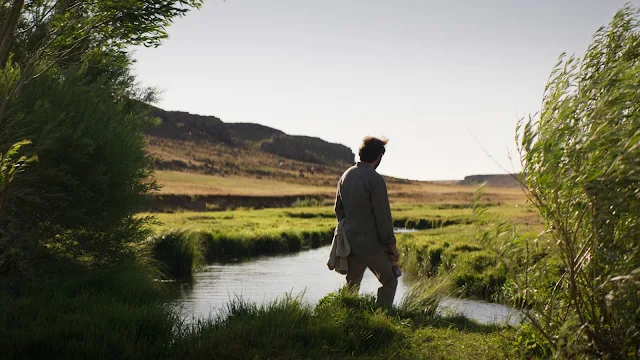 |
| Chiuxio Qu, Haoran Liu, and Dongyu Zhou in The Breaking Ice |
Cast: Dongyu Zhou, Haoran Liu, Chiuxio Qu, Ruguang Wei, Baisha Liu. Screenplay: Anthony Chen. Cinematography: Jing-Pin Yu. Production design: Luxi Du. Film editing: Hoping Chen, Mun Thye Soo. Music: Kin Leonn.
Anthony Chen's The Breaking Ice is a post-pandemic fable centered on three members of Generation Z, the cohort that perhaps suffered the greatest cultural dislocation when Covid emerged: At a time when they should have been exploring life's options, setting out on careers, discovering themselves, they were severely restricted. The film also features a relationship that has been oddly prevalent in movies recently, the two-guys-and-a-girl triangle popularized by French New Wave directors in films like François Truffaunt's Jules and Jim (1962) and Jean-Luc Godard's Bande à Part (1964). (It was also central to this year's film by Luca Guadagnino, Challengers.) The "girl" in this case is Nana (Dongyu Zhou), who works as a tour guide, a job she certainly doesn't want to turn into a career. Leading a group of tourists, she meets Haofeng (Haoran Liu), who works in finance in Shanghai and has come north for a friend's wedding. He takes the tour to fill time before his flight leaves, but being much younger than the rest of the tour group, he strikes up a conversation with Nana. When they return to the hotel, they continue to see each other, and eventually she introduces him to Xiao (Chiuxio Qu), who has come north to work for his aunt in a restaurant, a job he also doesn't intend to keep. The rest of the film is about the discoveries the somewhat misfit trio make about each other and themselves. Chen is a little too heavy-handed in creating epiphanic moments for his protagonists and with the trope announced in his title, from an opening sequence showing ice being cut into blocks to a scene near the end of the film in which the three protagonists pass an ice cube from mouth to mouth. Still, it's a film with engaging performances and the beautiful scenery of an unfamiliar setting: northeastern China right at the border with North Korea.













